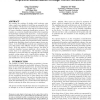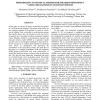304 search results - page 53 / 61 » How good are support vector machines |
DAS
2010
Springer
13 years 11 months ago
2010
Springer
We consider the problem of dealing with irrelevant votes when a multi-case classifier is built from an ensemble of binary classifiers. We show how run-off elections can be used to...
CORR
2008
Springer
13 years 7 months ago
2008
Springer
In this paper, we discuss the issues in automatic recognition of vowels in Persian language. The present work focuses on new statistical method of recognition of vowels as a basic...
IJMMS
2008
13 years 7 months ago
2008
Generally, an experienced therapist continuously monitors the affective cues of the children with Autism Spectrum Disorders (ASD) and adjusts the course of the intervention accord...
BIOINFORMATICS
2005
13 years 7 months ago
2005
Motivation: Remote homology detection between protein sequences is a central problem in computational biology. Supervised learning algorithms based on support vector machines are ...
PAMI
2011
13 years 2 months ago
2011
—Emerging applications of computer vision and pattern recognition in mobile devices and networked computing require the development of resourcelimited algorithms. Linear classifi...


